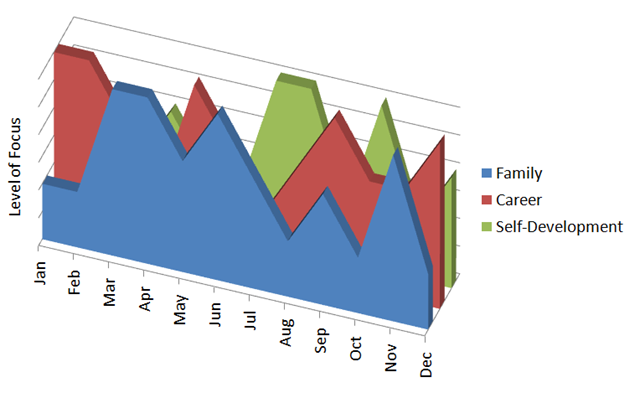Use Controlled Bursts of Focus to Leap Ahead And Find Balance
with 2 comments
 Finding balance is top of mind for so many people. As a topic of interest, it’s increasing in popularity on the web and in books and magazines year over year. It’s no wonder that in a 2007 survey by the American Psychological Association (APA), 48% of Americans surveyed feel their lives have become more stressful in the past five years. When you add up all of the inboxes you’re struggling to manage each day just to feel productive, and then add the expectation that you feel you need to react immediately, it’s no surprise. People have a lot of plates spinning simultaneously. More than one third of the people surveyed in this study feel that work encroaching on personal time was the reason for their increased stress. So naturally, finding balance is a life-essential skill for 2009 and beyond. Heck, even the contributors at Wikipedia agree, “As the separation between work and home life has diminished, this concept has become more relevant than ever before.”
Finding balance is top of mind for so many people. As a topic of interest, it’s increasing in popularity on the web and in books and magazines year over year. It’s no wonder that in a 2007 survey by the American Psychological Association (APA), 48% of Americans surveyed feel their lives have become more stressful in the past five years. When you add up all of the inboxes you’re struggling to manage each day just to feel productive, and then add the expectation that you feel you need to react immediately, it’s no surprise. People have a lot of plates spinning simultaneously. More than one third of the people surveyed in this study feel that work encroaching on personal time was the reason for their increased stress. So naturally, finding balance is a life-essential skill for 2009 and beyond. Heck, even the contributors at Wikipedia agree, “As the separation between work and home life has diminished, this concept has become more relevant than ever before.”
But what does balance really mean – and couldn’t it mean different things to different people? When people talk about balance, they’re frequently referring to work/life balance. A quick search on “work life balance” yields a number of results seemingly indicating that work/life balance means working a 9-5 job and then “shutting off”, compartmentalizing your work and home life. When you’re at work, you aren’t thinking about your home life – and when you’re at home, you definitely aren’t “worrying” about work. There are steps you can take to protect your personal time such as refusing to answer email off-hours, setting expectations up-front with your employer that you’re offline as soon as you walk out the door, planning recreational activities and sticking to a schedule, and so on.
Naturally I’m a big believer in embracing the present moment. But what if pure compartmentalization can lead to mediocrity? What if in the struggle for daily balance, you’re missing out on long-term accomplishment and complete contentment? If every single day contained a healthy balance over the course of a lifetime, would you meet or exceed the goals you set out for yourself? Would that make you happier or more content, or would it leave you feeling empty?
Years ago while still in college, I helped start a company with a couple good friends. It was an incredibly busy time for me; I was in my final year at Cornell University and was working to balance my class schedule to give myself enough time to focus on our new venture, while at the same time making sure I wouldn’t fail to graduate at the end of the year. I was in a serious relationship. I was also going through the job hunting process to make sure I’d have a job after graduation in the (very possible) chance the company didn’t succeed.
It was during this time I remember first really struggling with balance, and I spoke to a friend of mine about it. I’ll never forget what he said when I mentioned I didn’t feel rested and hadn’t exercised in a few days (an anomaly for me back then) because we had all been working so hard:
Finding balance doesn’t always have to be an everyday thing. You need to make sure you’re finding balance at a cadence that works for you – maybe that’s weekly, maybe that’s monthly, or maybe it’s annually. Look at finding balance in the aggregate and don’t worry about the details.
Since then, I’ve tried to leverage controlled bursts of focus to help me find balance in the aggregate, while at the same time accomplish the things I want to accomplish and feel content with the progress I’m making.
A controlled burst of focus can be defined at the highest level as a disruption to daily balance. It’s the string of nights you spend working on a project, or the few weeks spent sampling six different fitness classes. It’s also the vacation when you do nothing but read and spend time with your family.
It’s extra time and energy devoted to something that helps you make materially more progress than you would during a normal, balanced routine. If you plan to breakthrough mediocrity, controlled bursts of focus are a requirement. You won’t find many accomplished people who’ve always had a perfectly balanced day each day of their lives.
However, there’s a fine line between controlled bursts and an unhealthy, prolonged overemphasis on something. Before going too far with controlled bursts, check out these tips:
- Make sure your focus isn’t distracted because of something that ultimately isn’t important to you. Pick your top 3 focus areas and drop everything else. If you find yourself sacrificing too much for something that doesn’t resonate with your values, it’s doubtful this will result in contentment. Instead it will just result in resentment.
- Embrace emergent focus by applying all of your attention to the thing you’re most interested in at that exact moment… without guilt over what you’re not doing. In other words, if you find yourself in a groove at work with double the productivity and passion you normally have, use it! It’s a gift. This is frequently how ‘peak experiences’ come to be. So even if it means a little less balance on a day-to-day basis, it may be worth it.
- Kick start your interest in other areas if you find yourself unmotivated to break free from a burst. This will help you from getting carried away with a single burst, and let you get back to an overall balanced state over the long haul.
- Control the burst of focus and measure it if you have to. Make sure you don’t get sucked into an unhealthy state and start letting other important things hit the floor. If it helps, use a time log or a journal and make sure you’re not getting sucked into something at the expense of everything else. Give yourself a deadline when you’ll “snap out of it” and get back to a more balanced routine.
- Use a visual to help justify your energy investment. The visual that helps me the most is a surface chart of my focus areas for the year. Ultimately, I want the total surface area of each to be approximately equal (note that this isn’t time spent, it’s just a subjective estimate of focus applied to each area). Here’s a sample surface chart using my three focus areas (it isn’t using real data).
As is probably expected, some months have more dedicated focus on certain areas than others:

Bottom line: Controlled bursts of focus can help you leap ahead and achieve balance in the aggregate. So long as you’re honest about what you’re sacrificing and why, bursts can be an indispensible tool for overall, long-term focus, accomplishment, and contentment.
Thoughts? I’d love to hear them. Comment below!



